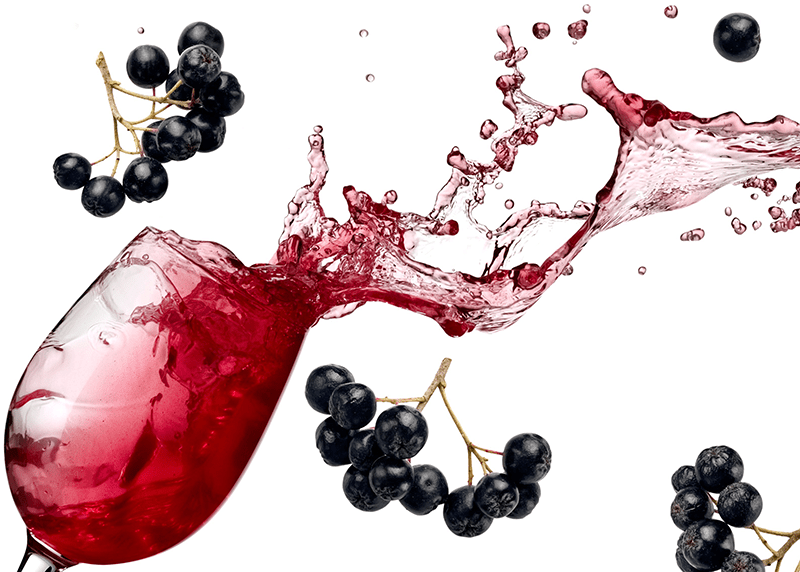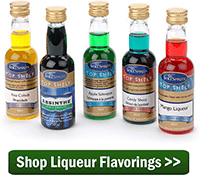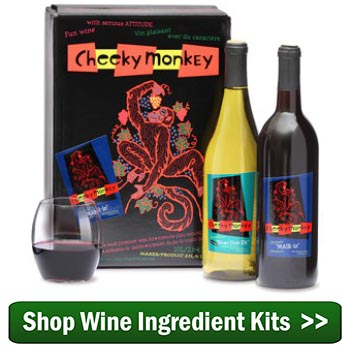 Just wondering if your liqueur flavorings could be added to a fruit wine as a wine flavoring additive… for a little stronger flavor… Our blackberry wine, from last year, is not real fruity…. and wondered if this would give it a flavor boost…
Just wondering if your liqueur flavorings could be added to a fruit wine as a wine flavoring additive… for a little stronger flavor… Our blackberry wine, from last year, is not real fruity…. and wondered if this would give it a flavor boost…
Thank you,
Sandy M.
—–
Hi Sandy,
To answer your question, yes, you can use these liqueur flavorings as wine flavoring additives to increase the flavor your wine. It is recommended that you do not add more than one bottle of flavoring to each five gallons. These extract flavorings are very strong, and should be used with care. Adding more than one or two bottles can bring a bitter aftertaste to the wine.
One of the wine making tips I tell people when using any kind of wine flavoring extract or additive, is that the full flavor impression does not usually take effect immediately. It takes a little time for the extracts flavoring to come together with the wine. Letting the wine sit a day to let the flavors mingle is recommended before making any decisions to add more flavoring.
 Before you decide to add liqueur flavorings to your wine, there is a point I’d like to bring up. One of the things that can throw you off as a home winemaker, particularly if you’re just beginning to learn how to make your own wine, is experiencing the flavors of a dry fruit wine. Dry means the wine has no taste-able sweetness to it, which is normally the case after fermentation, if the fermentation has completed successfully.
Before you decide to add liqueur flavorings to your wine, there is a point I’d like to bring up. One of the things that can throw you off as a home winemaker, particularly if you’re just beginning to learn how to make your own wine, is experiencing the flavors of a dry fruit wine. Dry means the wine has no taste-able sweetness to it, which is normally the case after fermentation, if the fermentation has completed successfully.
One of the effects that dryness has on a wine is that it reduces the fruity impression. When all the sugars have been fermented out of the fruit juice it takes on an entirely different character.
The reason I’m bringing this up is because, increasing the fruity flavors of the wine may be just a matter of adding some sweetness back to it, and bringing the wine back into better balance. This is simply done by adding a sugar/water syrup mixture to the wine until the desired effect has been achieved.
A wine stabilizer such as potassium sorbate will need to be added, as well, to keep the fermentation from starting up again. This is something that should be done at bottling time.
Even if you like your wines dry, adding some sugar to the wine to make it a little less puckering can bring out a substantial amount of fruitiness, so never rule out back sweetening a wine, regardless of your personal tastes.
Learning how to make adjustments to a wine before bottling is a big part of home winemaking. By utilizing tools such as wine flavoring additives you can increase the flavor and pleasure of your homemade wines.
Happy Wine Making,
Ed Kraus
—–
Ed Kraus is a 3rd generation home brewer/winemaker and has been an owner of E. C. Kraus since 1999. He has been helping individuals make better wine and beer for over 25 years.

I have found in my shed 70 bottles of Elderberry, Elderflower, Strawberry, Bullace and Rose Petal wine which I made back in 2012. I’d forgotten all about them, probably because at the time I used far too much finnings and didn’t know if it was OK. Will it be OK to drink because of the age and all the finnings? It tastes very strong but not much flavour, what can I do to add flavour as it all tastes pretty much the same?
It should be fine to drink. If there was any spoilage it would be visually evident with this much time passing. The lack if flavor is most likely due to the high alcohol level. It gives the wine a water-y effect. There’s not a whole lot you can do at this point. I might suggest that you blend it with other drinks as you consume it. For example, buy some elderberry juice and blend it with the elderberry wine as you drink it. Your imagination will be helpful in the scenario.
Let’s say I have fruit left over that I didn’t add to the fermentation, in my case cherries. Could I reserve the extra fruit and freeze to add filtered/clarified juice back into the wine for flavor/sweetness? Perhaps boiled or simmered, of course, to kill anything.
Very important question and I believe Ed will agree with me in my thought.
One of my friends here is making wine and his goal is to take as much alcohol from fruits as possible. As result, his wine is strong, 13% – 16% in alcohol, but has no taste of ru it at all. Alcohol kills the flavor. I do stop my fermentation at SG 1.010 or little less, to keep the wine in its original body. After aging for 6-8 months the wine is so delicious!!!
Try my secret, I got one from France, my grind gave me a secret of Royal wine, they were making for French kings. And I love it. It is 11%-13% strong and full of aroma of fruits!!!
You are right, I also ferment at 11% but very difficult to preserve. Could you make your advice clear more?
are you talking about fruit wines or in general?
Bob, this information pertains to any type of wine that you make. Sweetening any type wine will help bring out more flavors as well as adding the liqueur flavorings.
In trying to get the true fruit flavor out of my plum wine, I over-sweetened it. All I taste now is sugar. Is there something I can do to correct this? My friend told me to use this wine to sweeten my next batch instead of using simple sugar. I would like to try to correct this plum if I can. Anything I can do?
try adding vodka to it…..I did this when i added to much water and it turn out to be the best wine I ever made. do this in small glass
Laurie, about the only options to reduce the sweetness is to dilute the wine with water or add another dry wine of similar character.
Thanks. I think I’ll open a bottle of plum and mix it with the chokecherry or mixed fruit that I have made at the time I serve it (to myself) & see how that tastes.
Good morning, I am getting ready to make a batch of Pinot Grigio. I’m not a real big fan of this dry white wine but this box of wine was a gift. I have made this wine before and added a fruit juice to it I can’t remember when I added it but the color turned a nice blush color but I didn’t feell like it changed the flavor much. Can I add the fruit juice and adjust to taste when ready to bottle?
Penny, it is perfectly fine to use fruit juice to add more flavor and sweeten your wine once it is complete and ready to bottle.
Is there a way of calculating the alcohol content of my wine? I’ve made some and I have only a few bottles left and everyone that I have given it to has asked.
Tim, of all the wine making products that exist, the vinometer is the only one that home winemakers can practically use to test the final alcohol level of a finished wine. It is somewhat accurate when testing a dry wine, but if your wine has any residual sugars, the reading will be thrown way off. Most wineries rely on a refractometer and/or a gravity hydrometer to determine the alcohol level of a wine. They are both very accurate and easy to use. The drawback is they both require that you take two readings, one before the fermentation and another after. For more information on this subject please refer to the article link below.
Testing Alcohol Level Of A Finished Wine
https://blog.eckraus.com/testing-the-alcohol-level-of-a-finished-wine
My wine’s are fermented for 15-19% with current objectives of 15 – 16. I typically start off with more than the recipe amount of fruit that I press. I have added frozen concentrate and bottled concentrate during the last week or 2 of fermentation to help overpower the alcohol bite. Occasionally back sweeten half of a batch. Most often, after 8 months of aging, the dry tastes as good or better than the semi-sweet.
I have a batch of Concord wine in carboy for 1 week, SG at ..998. I have a Black Currant flavor i want to add and sweeten it. When can I add flavoring and sugar?
Don, you can sweeten your wine anytime after the fermentation is complete, the wine is clear and you have added potassium sorbate.
I had a cap on my wine and after two weeks of fermentation, it settled to the bottom. i added flavoring to the batch and now the entire batch is thicker than ever. what can i do to correct this situation?
It sounds like the flavoring you added may have been sugar based, and that is why your wine became thick. If this is the case, you will want to get the fermentation started again so that it can ferment some of the new sugars out. Realize, this is only a guess. I don’t know the type of flavoring your added, but I know of no other reason for the wine to become thick.
I had a poor season of grapes I commonly use (Frontenac, La Crescent, Marquette, etc. which I grow…however…”any port in the storm”. I live on heavily wooded acreage and I noted it has an abundance of wild grapes which I have never tapped for making wine…until now.
I now have about 5 gallons of 12-13 % Alc. red wine which is a bit wild and bitter. I know that wine batches like this end up after decent aging not too bad…and sometimes they don’t.
This is an opportunity for me here…I’m “darned” if I do, and even so if I don’t
So I’m open to any thoughts of how to make this “pig’s ear into a silk glove”…
Can you help?
George
New to making wine. Need to learn all I can.
Hello, I added flavor to the wine I am making. The flavor came mixed with glycol. I filtered the wine before boottling and the aromas went away. Can you explain this ? Is it normal ?
Thank you for your answer.
S. Lemire
Yes, this is normal. When you filter a wine you are essentially putting the wine into shock for a period of time. The aroma an character will come back after the wine has been given time to age. Here is more on what’s called “bottle shock”:
What is Bottle Shock and Why Does it Happen?
https://blog.eckraus.com/what-is-bottle-shock
This is my first visit to this site. Very pleased I found it….so informative.
I am a first time wine maker. I have 2 gallons of rhubarb grape that is almost ready to be bottled. I don’t taste any of the rhubarb which through reading the above posts is normal. I have learned here that I can either backsweeten or add fruit juice. I have canned rhubarb juice in my pantry which I would like to use to add flavor and color.
I am looking for your recommendation here as I am wanting to increase the rhubarb flavor and the sweetness of the wine. Do I do one or the other or can I dissolve sugar in the juice?
Following this I understand I add potassium sorbate (1/2 tsp per gallon of wine) and then bottle once I’m satisfied with the flavor. Is there any need to let the wine sit in the carboy for any length of time once the juice or dissolved sugar are added?
Prior to bottling I will add 1/16 tsp KMS per gallon of wine and .Super-Clear KC.
I just found your site today and it is so helpful. I will continue to learn all I can from your blog.
Thank you.
Cindy
I am going to try the Brewers Best flavorings this year to my wines, I always filter, then back sweeten, add the potassium sorbate then bottle. When should I add the flavoring? Before filtering or after?